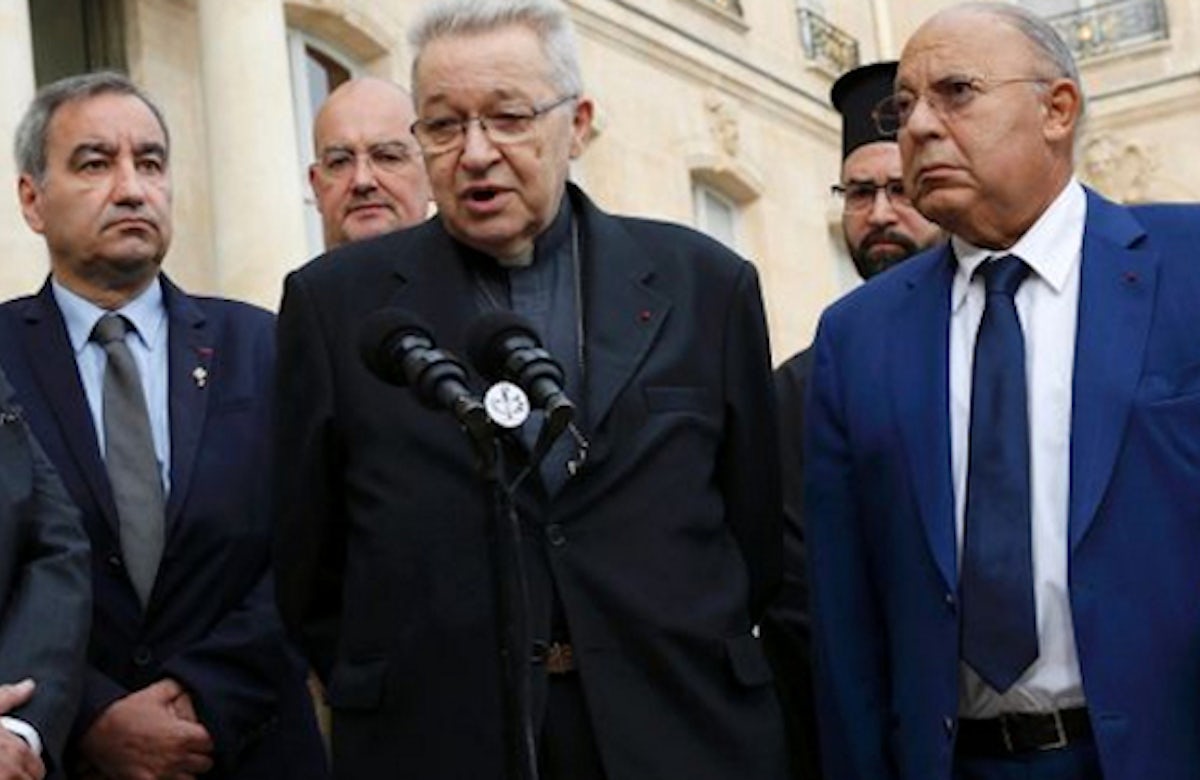The leaders of the main religions in France on Wednesday called for more security at places of worship following the murder of a priest in Normandy on Tuesday.
 Representatives of the Jewish, Christian, Muslim and Buddhist faiths spoke after meeting French President François Hollande. Fr. Jacques Hamel was killed while conducting morning mass in his church. Tuesday's attack took place in a Catholic church in a suburb of the Norman capital Rouen. The church of Saint-Etienne-Du Rouvreay was the first Christian house of worship to be attacked in France. A previous terrorist plot against a church in the Paris area was foiled.
Representatives of the Jewish, Christian, Muslim and Buddhist faiths spoke after meeting French President François Hollande. Fr. Jacques Hamel was killed while conducting morning mass in his church. Tuesday's attack took place in a Catholic church in a suburb of the Norman capital Rouen. The church of Saint-Etienne-Du Rouvreay was the first Christian house of worship to be attacked in France. A previous terrorist plot against a church in the Paris area was foiled.
One of the two men who attacked Fr. Hamel was wearing an electronic surveillance tag, which was temporarily turned off under his probation conditions. The killing came 12 days after the terrorist attack in Nice, in which 84 people died.
"We are urging the government to take the necessary measures to provide citizens protection and security,” said a joint statement issued by France’s Chief Rabbi Rabbi Korsia and Joel Mergüi, president of the Consistoire, the organization that administers most synagogues and Jewish schools in France.
"We may not have the authority to say which forces should go where, but we’re not blind,” said the chief rabbi’s adviser Yael Hirschhorn. “Attacks have been multiplying and like every citizen we believe there must be a way to do a better job on security."
The Jewish umbrella group CRIF said on Tuesday the attack showed terrorists are multiplying their targets. "This attack is a new phase of terrorist expansion."
Muslim leader Dalil Boubakeur, the rector of the Great Mosque of Paris, said the leaders "deeply desire that our places of worship are the subject of greater [security] focus, a sustained focus", as even "the most humble place of worship" could be subject to an attack.
Boubakeur expressed "profound sorrow" on behalf of French Muslims at the attack, which he described as a "blasphemous sacrilege".
The archbishop of Paris, Cardinal André Vingt-Trois, praised the harmonious relations between France's religions. "We must not let ourselves get pulled in to Daesh's political games," he said, referring to the self-styled Islamic State group (IS), saying it wanted "to set children of the same family against each other".
The French prosecutor identified one of the attackers as Adel Kermiche, a 19-year-old who grew up in the town and tried to travel to Syria twice last year using family members' identity documents. He was detained outside France, sent home, handed preliminary terrorism charges and wore a tracking bracelet.
The identity of the second attacker has not been made public. Police combing the area after the attack detained a 16 year-old whom prosecutor Francois Molins said was the younger brother of a young man who traveled to the Syria-Iraq zone of the Islamic State group — carrying the ID of Kermiche.
Meanwhile, the leader of the main French opposition party, former President Nicolas Sarkozy, has called for the detention or electronic tagging of all suspected Islamist militants, even if they have committed no offense. France's internal security service has confidential "S files" on some 10,500 suspected or aspiring jihadists.
Interior Minister Bernard Cazeneuve rejected Sarkozy's proposal, saying that to jail them would be unconstitutional and in any case could be counterproductive. "What has enabled France to break up a large number of terrorist networks is keeping these people under 'S file' surveillance, which allows intelligence services to work without these individuals being aware," he said on 'Europe 1' radio.






